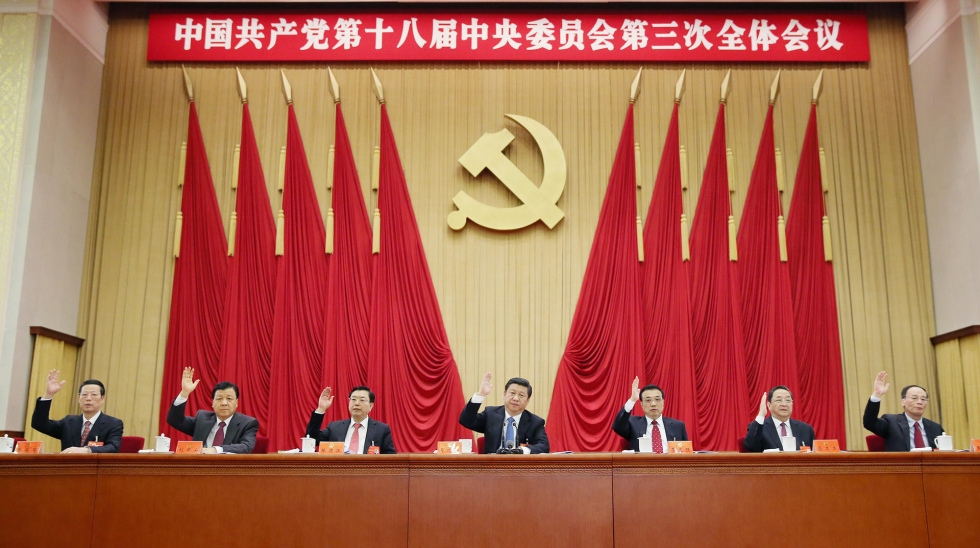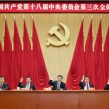
Chinese Party Meeting Calls for Establishing ‘National Security Council’
Publication: China Brief Volume: 13 Issue: 23
By:

The leaders of the Chinese Communist Party have resolved to establish a national security council (guojia anquan weiyuanhui) in order to “perfect the national security system and strategy, and guarantee national security” (Xinhua, November 12). The call, buried in the final communiqué of the Third Plenum of the Central Committee, appears from context to be focused on addressing domestic threats to the Party, but both the choice of name—the same as the Chinese translation of the names of the U.S. and Russian National Security Councils (NSC)—and the leadership’s recent decision to apply the concept of “top-level design” to foreign affairs suggest that this body may come to function as a Chinese equivalent of its international counterparts, as a venue for inter-agency coordination on security issues (on top-level design, see Timothy Heath, “Diplomacy Work Forum: Xi Steps Up Efforts to Shape a China-Centered Regional Order” in China Brief, Vol. XIII, Issue 22).
As such, the proposal likely reflects a recognition that the Chinese system has profound problems with inter-agency cooperation, but is probably not a hasty response to recent terrorist attacks—rather, as Heath showed in the piece referenced above, Chinese President Xi Jinping has already begun an effort to integrate strategic planning between organizations with an interest in foreign relations. A new NSC may be a step in this direction, or, if its brief is mostly focused on internal threats, it could be an application of this principle to stability preservation.
There is, as yet, almost no information available on the new body. It is mentioned in a single sentence of the communiqué, at the end of a paragraph on social management sandwiched between paragraphs on inequality and “ecological civilization.” A complete translation of the relevant paragraph follows:
The Plenary session raised the issue of innovation in social management. [We] must focus on protecting the fundamental interests of the majority, maximizing harmonious social elements, enhancing the vitality of society, improving the level of social management and protecting national security to ensure that the people can live and work happily and to ensure social stability. [We] must advance the style of social management, stimulate the vitality of social organizations, innovate an effective system to prevent and resolve social contradictions and build the whole public security system. [We will] establish a national security council to perfect the national security system and strategy, and ensure national security.
[The “we”s have been added for clarity; the Chinese text has no grammatical subject.]
This statement, of course, raises far more questions than it answers—we do not yet know who will belong to the new council, or indeed whether it will belong to the Party or the government. If it is a government body, it is unclear whether it will have any authority over the military, which reports only to the Central Military Committee of the Party.
“Social management,” the policy context in which the proposal was made, is a phrase coined by Hu Jintao—probably, like “top-level design,” an application of the language of engineering to governance. It is loosely defined but clearly aimed at preventing social unrest through proactive measures to address grievances before they spill over into conflict. Stability is referenced throughout the communiqué, both in measures specifically directed at it and as a problem that can only be solved by thorough reforms. Famously, China spends comparable amounts on its military and police forces, although reports that the police budget is larger are questionable owing to the problem of categorizing the paramilitary People’s Armed Police (Reuters, March 5).
Immediate Chinese media reports are mostly limited to briefs excerpting the passage above, although some outlets have described the new Council as a response to recent terrorist attacks in Tiananmen Square and the city of Taiyuan, suggesting that it will develop a comprehensive anti-terrorist strategy (China Daily, November 12; on the Tiananmen attack, see China Brief, Vol. XIII, Issue 22). Terrorism is frequently classed as an external threat, even when perpetrated by Chinese Uighurs—it is blamed on the influence of foreign organizations involved with the “Three Evils” of separatism, terrorism, and extremism and pursued through international venues such at the Shanghai Cooperation Organization.
He Zhijiang, an economic columnist (non-authoritative), suggests that the Council is intended to oversee the judiciary and Party discipline systems, centralizing local oversight while taking power away from the Political-Legal Committee (Netease, November 12; on the standing of the Political-Legal Committee, see China Brief, Vol. XIII, Issue 10).
However, it is also highly likely that the proposed Council will attempt to cover international issues in a manner similar to its U.S. counterpart, especially focusing on interagency coordination. The name has been borrowed from the U.S. and Russian bodies, which Chinese media have been examining for clues to the functioning of the new system (People’s Daily, November 12).
Interagency coordination is also a major problem for the Chinese system, which is ridden with bureaucratic rivalry and provides few paths for “horizontal” communication between ministries or between branches of the military. In the military, this has been a matter of concern for years, although little progress has been made, while Chinese President Xi Jinping’s recent work forum on peripheral diplomacy addressed the problem in international relations, calling for increased coordination via “top-level design” to achieve overall strategies for dealing with China’s neighborhood. A National Security Council would be a natural forum for establishing top-level designs for international affairs.
Many proposals from Party meetings evaporate before appearing as policy, and organizational changes that threaten the power of bureaucracies are particular hard to achieve—so it is impossible to say whether or when this new Council may be established and meet. But any further statements about it should be closely watched to establish who will make up this council and what authority it will have—and especially whether it may be able to break down some of the walls between China’s many agencies involved in security policy formation.




